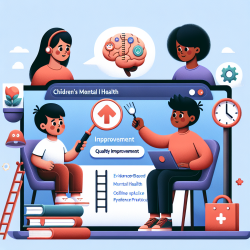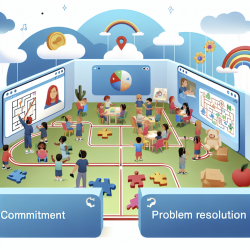Introduction
In the realm of children's mental health, practitioners often face challenges in implementing effective care strategies. A recent systematic review titled "Quality improvement, implementation, and dissemination strategies to improve mental health care for children and adolescents" provides a data-driven approach to overcoming these hurdles. This blog post will delve into key findings from the review and offer practical steps for practitioners to enhance their skills and outcomes.
Understanding the Research
The systematic review examined various strategies aimed at improving mental health care for children and adolescents. The study focused on three primary goals:
- Assessing the effectiveness of quality improvement, implementation, and dissemination strategies.
- Examining potential harms associated with these strategies.
- Determining if effectiveness or harms differ based on system, organizational, practitioner, or patient characteristics.
The review analyzed 19 studies, identifying 18 different strategies. Notably, 11 strategies showed significant improvements in intermediate outcomes, final health outcomes, or resource use.
Key Findings for Practitioners
One of the standout findings was the effectiveness of financial incentives, such as pay-for-performance, in enhancing practitioners' competence in implementing evidence-based practices (EBPs). This strategy was supported by moderate strength of evidence, highlighting its potential in improving practice outcomes.
However, the evidence was inconsistent for strategies involving educational meetings, materials, and outreach. Success was more likely when these were combined with reminders or newly collected clinical information for practitioners.
Practical Steps for Practitioners
Based on the review, here are some actionable steps practitioners can take to improve their skills and outcomes:
- Incorporate Financial Incentives: Consider integrating financial incentives to motivate and enhance the competence of your practice in implementing EBPs.
- Combine Educational Strategies: Use educational meetings and materials in conjunction with reminders or clinical data to reinforce learning and application.
- Engage in Continuous Learning: Stay updated with the latest research and strategies in mental health care to continually improve your practice.
- Utilize Feedback Mechanisms: Implement regular feedback systems to monitor patient progress and adjust strategies accordingly.
Encouraging Further Research
While the review provides valuable insights, it also highlights the need for further research to explore the effectiveness of various strategies comprehensively. Practitioners are encouraged to participate in or support research initiatives that aim to bridge the gap between evidence and practice.
Conclusion
Improving mental health care for children and adolescents requires a multifaceted approach. By adopting data-driven strategies and continuously refining their practice, practitioners can significantly enhance outcomes for their young patients. For those interested in delving deeper into the research, the original study offers a wealth of information and can be accessed here: Quality improvement, implementation, and dissemination strategies to improve mental health care for children and adolescents: a systematic review.










